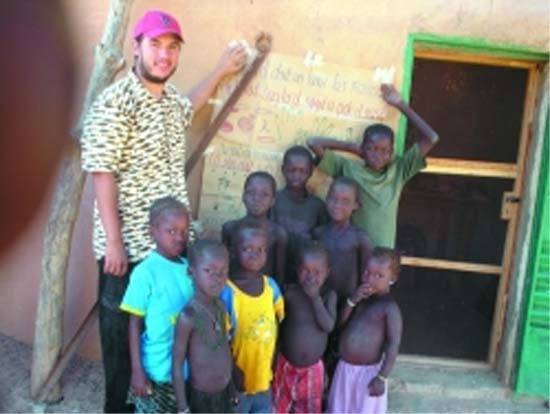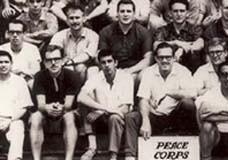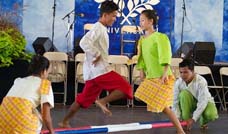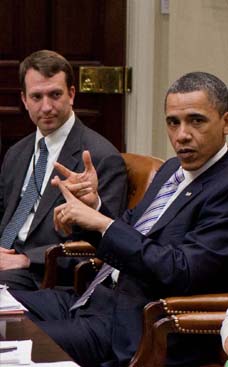
From October 2008 to November 2010, Fournier lived and worked in a small village of 6,000 people in the northeastern part of Burkina Faso, a dry area known as the "Sahel." "The different values that they possess and we need to work on are quite evident," he says. "People in Africa are willing to give the shirts off their backs to you if you are in need, especially if you are a foreigner. Unfortunately, I haven't seen many people like that here. I think these concepts were some of the biggest lessons I learned from serving in West Africa." During the two years Fournier worked and lived in the village, he developed a strong bond with the community. "I feel that I have developed personally, extending my perspective of the world," he said. "I have learned that there is more to the world than what we Americans think. All the conveniences that we have in America are not considered essential in different cultures. In fact, some of them are considered unnecessary." Fournier says none of these self-realizations would have been possible had it not been for the Peace Corps, which is celebrating its 50th anniversary this year.
If there was ever a life-changing moment during Robert Fournier Jr.'s two-year mission in Burkina Faso as a Peace Corps volunteer, it was his new-found understanding of what he says are the most important things in life: family and friends
BMR grad serves in Peace Corps, learns how others think outside the U.S.
March 27, 2011
By JOSEPH FITZGERALD
BLACKSTONE - If there was ever a life-changing moment during Robert Fournier Jr.'s two-year mission in West Africa as a Peace Corps volunteer, it was his new-found understanding of what he says are the most important things in life: family and friends.
"In Burkina Faso, everyone in the village greets and talks to everyone else. Here (in Massachusetts), I'm lucky if someone gives me brief eye contact when I say hello," says Fournier, 30, a 2000 graduate of Blackstone-Millville Regional High School, who recently returned to town after a two-year stint as a community development facilitator for the Peace Corps' health program in the West African nation of Burkina Faso.
From October 2008 to November 2010, Fournier lived and worked in a small village of 6,000 people in the northeastern part of Burkina Faso, a dry area known as the "Sahel."
"The different values that they possess and we need to work on are quite evident," he says. "People in Africa are willing to give the shirts off their backs to you if you are in need, especially if you are a foreigner. Unfortunately, I haven't seen many people like that here. I think these concepts were some of the biggest lessons I learned from serving in West Africa."
During the two years Fournier worked and lived in the village, he developed a strong bond with the community.
"I feel that I have developed personally, extending my perspective of the world," he said. "I have learned that there is more to the world than what we Americans think. All the conveniences that we have in America are not considered essential in different cultures. In fact, some of them are considered unnecessary."
Fournier says none of these self-realizations would have been possible had it not been for the Peace Corps, which is celebrating its 50th anniversary this year.
The Peace Corps is an American volunteer program run by the United States Government, as well as a government agency of the same name. The mission of the Peace Corps includes three goals: providing technical assistance, helping people outside the United States to understand U.S. culture, and helping Americans understand the cultures of other countries. It was established by executive order on March 1, 1961 by President John F. Kennedy, and authorized by the Congress on Sept. 22, 1961.
Since 1961, over 200,000 Americans have joined the Peace Corps and have served in 139 countries.
"During President Kennedy's campaign, he spoke to a gathering of students at the University of Michigan in Ann Arbor who were waiting for hours to hear him speak," Fournier said. "On the steps of the University of Michigan Student Union, he challenged the students to serve their country in the cause of peace by living and working in developing countries, an idea that inspired the creation of the Peace Corps. He challenged the students to do something larger than them. The rest is history."
Fournier decided to take on that challenge in 2007.
After graduating from Blackstone-Millville Regional High School in 2000, he attended Worcester State College where he earned a bachelor of arts degree in history and English in 2007. After a year-long application process to enter the Peace Corps, he was finally accepted to serve as a community health development facilitator in West Africa.
"My village lacked modern conveniences such as electricity and running water, and it was not uncommon to have to climb a hill or the roof of a hut to search for cell phone reception, which would arrive sporadically," he said. "The roads were also in tough shape, a problem that escalated during the rainy season because some areas were impassable due to floods and the collapsing of poorly-constructed bridges."
Fournier said while life was difficult in the village it was not impossible.
"People have the means to adapt to almost any environment, with or without many resources, and in Burkina Faso, this adaptability was an every day reality," he explained.
As a community health development facilitator, Fournier's main responsibilities revolved around aiding the local health clinic, promoting the villagers to visit when in need of medical help and working with local counterparts to create community-based projects.
The tasks at hand proved to be more difficult than expected, he said.
"I had to cross some of the barriers that culture and gender roles had cemented in Burkinabe society as well as learn two languages to help my work become more successful," he said. "Often, I would spend time talking to different husbands, explaining the importance of why women need to bring their children to the clinic to remain updated with all the necessary vaccinations."
Fournier also gave several health presentations to groups of villagers at different times throughout his service.
"My most frequent and successful presentations consisted of talking about HIV/AIDS to large groups of people at the local market, sometimes totaling up to 250 people," he said. "It was a challenge to present in their language, but overall I feel that I was successful in delivering the general message."
Fournier also managed two large projects, including construction of a new pavilion at the health clinic and installation of 18 latrines.
"Although I had a few unconquered challenges during my service, I believe that I was successful overall," he said. "But I think that my biggest success was the ability to take two years of my life, adapt to a foreign culture, and do something bigger than myself. The Peace Corps helped me find myself and I hope many people will consider joining."
Fournier is currently applying for Teach for America, a program that puts teachers in impoverished schools throughout the United States.
"I urge everyone in our communities to reach out and take some time from their hectic lives to lend a hand and volunteer, whether it is in the Peace Corps or somewhere local," he said. "There is nothing to lose and everything to gain by volunteering and helping others."
















